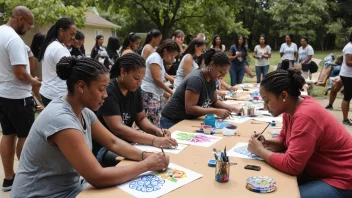Education is a fundamental right that fosters personal and societal growth, yet millions around the world still face barriers to access. Advocating for equitable access to educational resources is essential in creating a fair and just society. This article explores actionable ways individuals can contribute to this cause, highlighting the importance of awareness, involvement, and community action. By understanding the various methods of advocacy, we can collectively work towards a future where education is accessible to all.
Understand the Landscape of Educational Inequities
To effectively advocate for equitable access to education resources, it’s crucial to first understand the challenges faced by marginalized communities. Take time to research and learn about:
- The disparities in funding and resources between urban and rural schools.
- The impact of socioeconomic status on educational opportunities.
- Barriers faced by students with disabilities or those from minority backgrounds.
- The role of policy decisions in shaping educational access.
By familiarizing yourself with these issues, you can better articulate your advocacy efforts and tailor them to address specific needs.
Engage with Local Education Initiatives
One of the most effective ways to advocate for equitable access is to get involved with local education initiatives. Consider:
- Volunteering with organizations that provide tutoring and mentoring programs.
- Joining community forums to discuss educational policies and their impacts.
- Supporting local schools through donations of books, supplies, or time.
- Campaigning for local funding initiatives aimed at improving school facilities.
Engagement at the community level not only helps those in need but also builds a network of advocates committed to educational equity.
Utilize Social Media for Awareness
In today's digital age, social media serves as a powerful tool for advocacy. To harness its potential:
- Share articles and stories that highlight educational inequities.
- Use hashtags to connect with broader movements focused on education access.
- Encourage discussions around educational policies and their effects on different communities.
- Promote local events and initiatives aimed at improving educational resources.
By raising awareness through social media, you can reach a wider audience and inspire others to join the cause.
Advocate for Policy Changes
- Identify key policies affecting education in your area and assess their impact.
- Write letters to local representatives urging them to support equitable education policies.
- Participate in rallies or campaigns advocating for policy changes.
- Collaborate with local organizations that focus on educational reform.
By advocating for policy changes, you can contribute to long-term solutions that foster equitable access to education.
Support Inclusive Educational Practices
Education is not just about access but also about ensuring that the learning environment is inclusive. Consider the following:
- Encourage schools to adopt inclusive teaching practices that cater to diverse learning needs.
- Advocate for training programs for teachers on cultural competency and inclusion.
- Support initiatives that provide resources for students with disabilities.
- Promote after-school programs that support students from disadvantaged backgrounds.
By fostering inclusive practices, we can ensure that all students have the opportunity to succeed regardless of their background.
In conclusion, advocating for equitable access to education resources is a multifaceted endeavor that requires understanding, engagement, and action. By educating ourselves about the challenges, getting involved with local initiatives, leveraging social media, pushing for policy changes, and supporting inclusive practices, we can make significant strides toward ensuring that every individual has access to quality education. Together, we can create a world where education is not a privilege, but a right for all.






